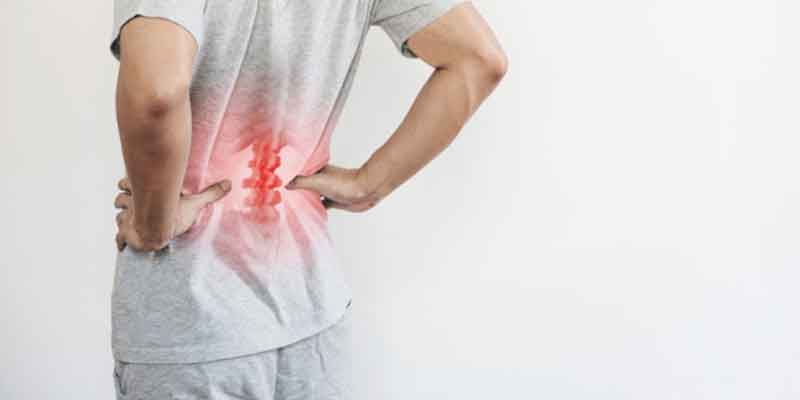What is Slipped Disc?
A slipped disc, also known as a herniated disc or disc prolapse, is a condition that affects the spine. The spine is made up of bones called vertebrae, and in between each vertebra is a cushion-like structure called an intervertebral disc. These discs have a tough outer layer called the annulus fibrosus, which surrounds a gel-like center called the nucleus pulposus. The discs serve as shock absorbers and allow the spine to move and bend.
A slipped disc occurs when the soft gel-like center of the disc pushes out through a tear or weakness in the outer layer and compresses the nerves in the spinal canal. This can result in a range of symptoms depending on the location and severity of the herniation.
Common symptoms of a slipped disc include pain, numbness, and tingling in the affected area. For example, if the slipped disc is in the lower back, it may cause pain that radiates down the leg and into the foot. This is known as sciatica. Other symptoms can include weakness and muscle spasms. The severity of these symptoms can vary, and some people may experience no symptoms at all.
The causes of a slipped disc can vary, but they often occur as a result of aging and wear and tear on the spine. As we age, the intervertebral discs lose some of their water content, making them less flexible and more prone to herniation. However, certain factors can increase the risk of developing a slipped disc, such as lifting heavy objects incorrectly, being overweight or obese, and engaging in activities that put excessive strain on the spine.
Diagnosing a slipped disc typically involves a physical examination and may include imaging tests such as X-rays, MRI scans, or CT scans. Treatment options for a slipped disc depend on the severity of the symptoms and can range from conservative measures such as rest, physical therapy, and pain medication, to more invasive interventions such as steroid injections or surgery in severe cases.
What causes Slipped Disc?
One of the primary causes of slipped discs is age-related degeneration. As we get older, the discs in our spine gradually lose their water content and become less flexible. This makes them more prone to damage and can increase the risk of a disc slipping out of place. Additionally, the wear and tear that occurs over time can weaken the outer layer of the disc, making it more susceptible to herniation.
Another common cause of slipped discs is trauma or injury to the spine. This can occur from accidents such as falls, lifting heavy objects incorrectly, or participating in high-impact sports. The force exerted on the spine during these activities can cause the disc to shift out of its normal position. Similarly, repetitive motions or frequent heavy lifting can also contribute to the development of a slipped disc.
In some cases, genetic factors may play a role in the development of slipped discs. Certain individuals may have an inherited predisposition to weaker discs or a higher likelihood of disc degeneration. This can increase their risk of experiencing a slipped disc, even at a young age.
Finally, lifestyle factors such as obesity and a sedentary lifestyle can contribute to the development of slipped discs. Excess weight puts added pressure on the spine and can increase the risk of disc herniation. Likewise, a lack of regular physical activity can weaken the muscles that support the spine, making it less stable and more susceptible to injury.
What precautions you should take for Slipped Disc?
First and foremost, it is crucial to avoid activities that could exacerbate the condition. This includes heavy lifting, twisting, and bending. Any movement that puts strain on the affected area can worsen the symptoms and potentially lead to further damage. It is important to listen to your body and take breaks when needed.
In addition to avoiding strenuous activities, maintaining good posture is key in managing a slipped disc. Poor posture can put additional pressure on the spine and exacerbate the symptoms. Pay attention to your posture while sitting, standing, and walking. Incorporate exercises and stretches that support good posture into your daily routine.
Physical therapy can also play a significant role in the treatment and management of a slipped disc. Working with a physical therapist can help you learn proper body mechanics, exercises, and stretches to support your spine and alleviate symptoms. They can also guide you through a gradual and safe return to activities.
Furthermore, it is essential to maintain a healthy lifestyle and weight. Excess weight can put strain on the spine and increase the risk of further injury. A well-balanced diet and regular exercise can not only aid in weight management but also promote overall spine health.
What are the main symptoms of Slipped Disc?
One of the most commonly reported symptoms of a slipped disc is severe and persistent back or neck pain. This pain may radiate to other areas of the body, such as the legs or arms, depending on the location of the affected disc. This pain is often described as a sharp or shooting sensation, which can worsen with movement or certain positions.
Another common symptom is numbness or tingling in the affected area or along the nerve pathway. This occurs because the slipped disc can compress the nearby nerves, causing a disruption in signals between the brain and the affected body part. It’s not uncommon for patients to report a feeling of pins and needles or a loss of sensation in specific areas, such as the fingers, toes, or buttocks.
Weakness in the muscles connected to the affected nerves can also be a sign of a slipped disc. Patients might experience difficulty lifting objects, walking, or performing activities that require strength in the affected area. This muscle weakness is a result of the impingement of nerves by the herniated disc, which disrupts the normal communication between the brain and muscles.
In some cases, individuals with a slipped disc may also experience changes in their reflexes. Usually, a healthcare professional may check reflexes using a rubber hammer to tap specific areas, such as the knee or the wrist. However, a slipped disc can cause abnormal reflex responses, indicating nerve involvement.
How Slipped Disc is diagnosed?
Diagnosing a slipped disc starts with a thorough evaluation of the patient’s medical history. This involves gathering information about the patient’s symptoms, the duration of the pain, and any previous episodes of back or neck pain. After taking the medical history, a physical examination is conducted to assess any physical signs that may indicate a slipped disc, such as reduction in muscle strength, reflex abnormalities, or limited range of motion.
One of the most common diagnostic tools used to confirm the presence of a slipped disc is imaging tests. X-rays can provide important information about bone abnormalities, but are less effective in diagnosing soft tissue problems such as a slipped disc. MRI (magnetic resonance imaging) scans are frequently employed, as they can provide detailed images of the soft tissues and spinal structures. CT (computerized tomography) scans may also be used, particularly if the MRI results are inconclusive.
In some cases, additional diagnostic tests, such as electromyography (EMG) or nerve conduction studies (NCS), may be required to assess the electrical activity of the nerves and muscles. These tests can provide valuable information about the location and severity of nerve compression caused by a slipped disc.
What are some of the main medical treatments for Slipped Disc?
When it comes to treatments for a slipped disc, there are several options available. The goal of treatment is typically to reduce pain, improve mobility, and allow the disc to heal. One common treatment option is medication, such as nonsteroidal anti-inflammatory drugs (NSAIDs) to reduce pain and inflammation. In more severe cases, a doctor may prescribe stronger pain medications or muscle relaxants.
Physical therapy is another important treatment for a slipped disc. This can include exercises to strengthen the surrounding muscles, as well as stretches and other techniques to relieve pressure on the disc.
If conservative measures are not effective, more invasive treatments may be considered, such as epidural steroid injections to reduce inflammation or in extreme cases, surgery to repair or remove the damaged disc.
Which supplements work best with Slipped Disc?
When it comes to managing a slipped disc, there are several supplements that may be beneficial in supporting the healing process and reducing symptoms. It is important to note that supplements should always be used in conjunction with a comprehensive treatment plan prescribed by a healthcare professional.
One supplement that has shown promise in managing slipped discs is glucosamine. This compound is naturally found in the body and plays a key role in the formation and repair of cartilage, which is essential for the health of spinal discs. Glucosamine supplements have been found to reduce inflammation and promote the regeneration of damaged cartilage, potentially helping to alleviate pain and improve mobility.
Another supplement that may be beneficial is Omega-3 fatty acids. Found in fish oil, flaxseed oil, and certain nuts and seeds, Omega-3 fatty acids have powerful anti-inflammatory properties. By reducing inflammation in the spine, these supplements can help to alleviate pain and discomfort associated with a slipped disc. In addition, Omega-3 fatty acids may also support overall spinal health and improve joint function.
Curcumin, a compound found in turmeric, has also gained attention for its anti-inflammatory properties. Studies have shown that curcumin can reduce inflammation and pain in various joint conditions, including slipped discs. Taking curcumin supplements may help to alleviate symptoms and enhance the healing process.
Frequently Asked Question on Slipped Disc
What is a slipped disc?
A slipped disc, also known as a herniated disc, is a common condition that affects the spine. It occurs when the soft inner portion of a disc protrudes through the outer ring. This can put pressure on nearby nerves, causing pain, numbness, and weakness in the affected area.
Is surgery always necessary for a slipped disc?
No, surgery is not always necessary for a slipped disc. Many cases can be effectively managed with conservative treatments such as medication, physical therapy, and lifestyle modifications. Surgery is typically considered when conservative treatments have failed to provide relief, or when there is evidence of severe nerve damage or loss of function. It is important to consult with a medical professional to determine the most appropriate treatment approach for your specific condition.
Can a slipped disc heal on its own?
In some cases, a slipped disc can heal on its own with conservative treatments and time. The body has the ability to reabsorb the protruding portion of the disc and alleviate symptoms. However, this process can vary from person to person and can take several weeks to months. It is important to follow the recommended treatment plan and consult with a medical professional for guidance throughout the healing process.
How can I prevent a slipped disc?
While it is not always possible to prevent a slipped disc, there are steps you can take to reduce your risk. These include:
Maintaining good posture and body mechanics
Engaging in regular exercise to strengthen the muscles that support the spine
Avoiding excessive bending, twisting, and lifting
Using proper lifting techniques when necessary
Maintaining a healthy weight
Practicing stress management techniques to reduce tension in the muscles and spine
Understand the who, what & why behind your favourite products
Brand Values | Product Philosophy | Product USPs
Read brand stories, their raison-d'etre, and understand what drives them to caringly create the highest quality products for your well-being.
Brand stories
Expert reviews you can rely upon
Expert Insights | Product Reviews | Connect with Experts
Gain valuable insights and read unbiased product reviews by subject matter Experts on Zotezo, the ultimate trust commerce platform, that empowers millions globally to make informed decisions for their wellbeing.
Expert Advisory



